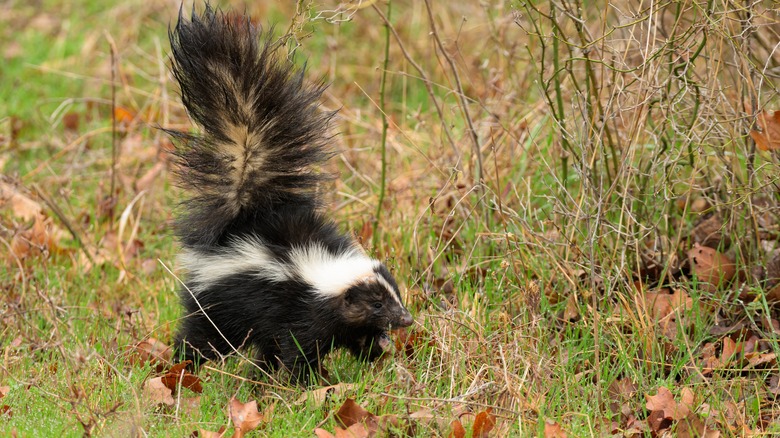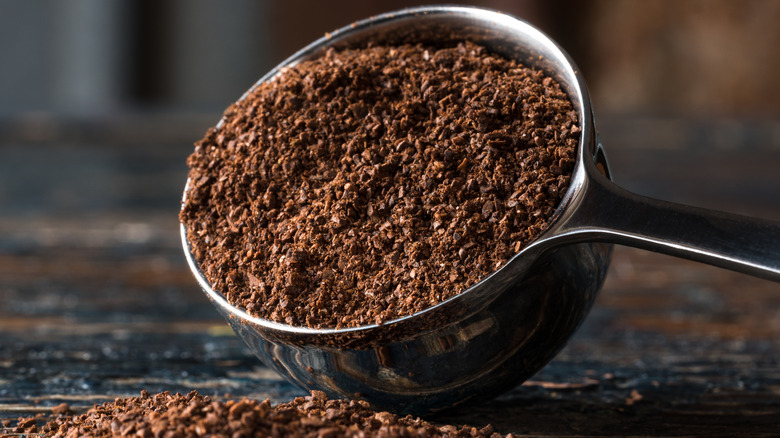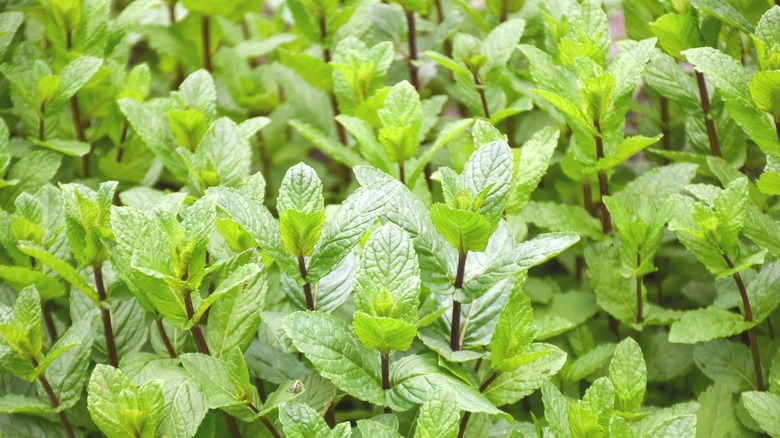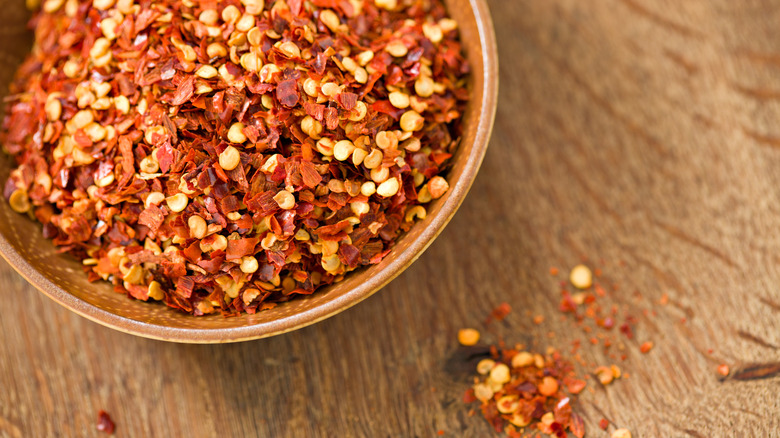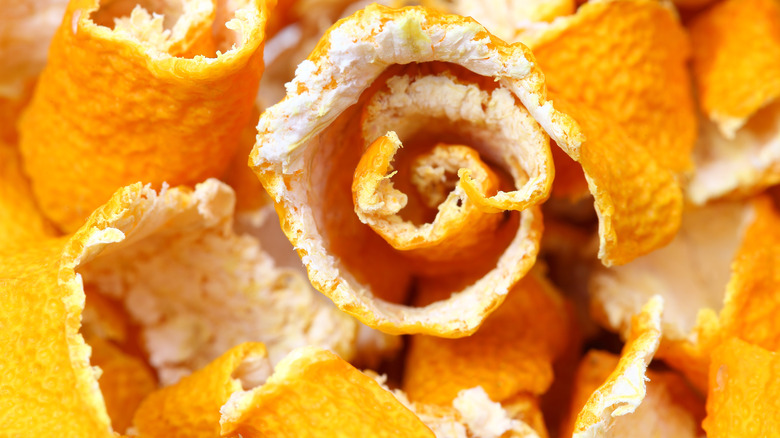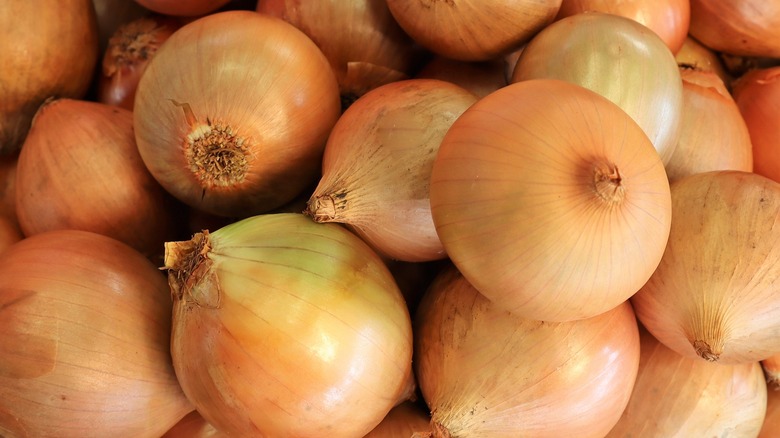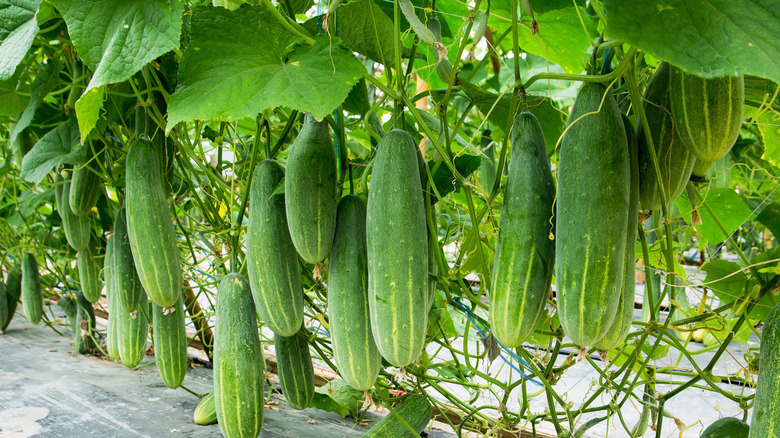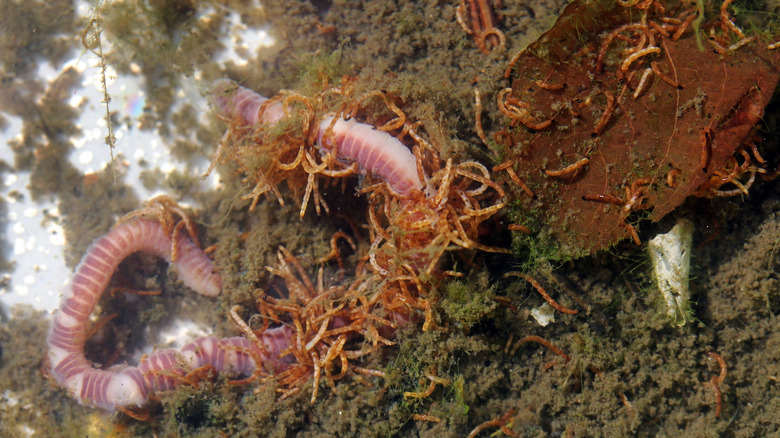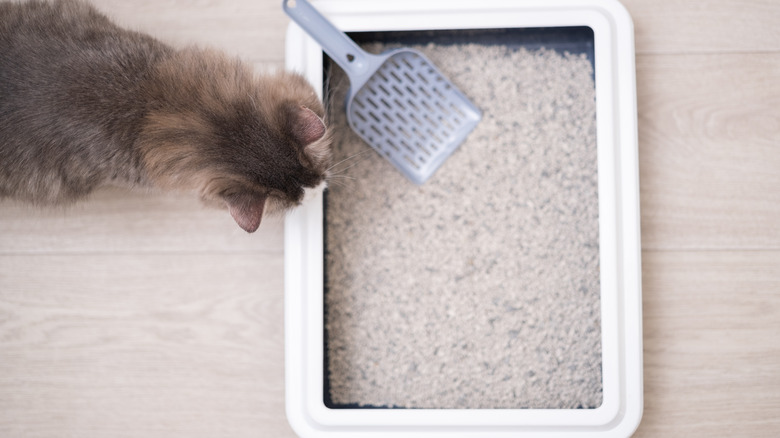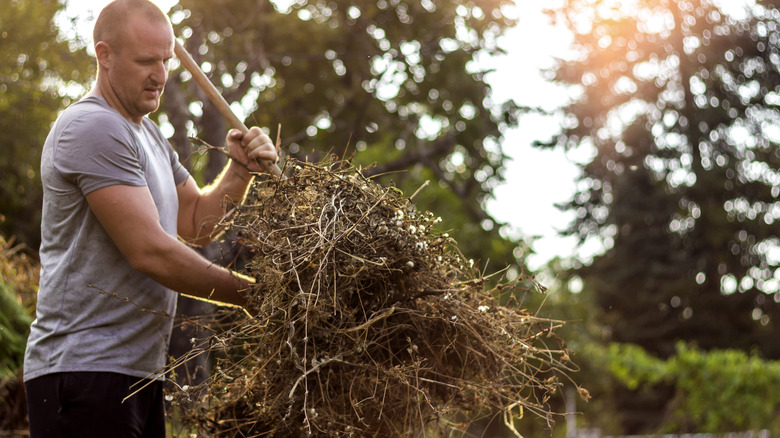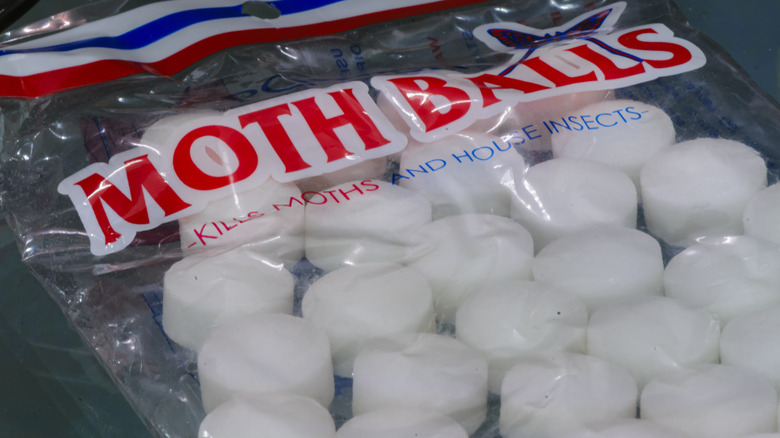12 Clever Hacks To Repel Skunks From Your Garden
We may receive a commission on purchases made from links.
Caring for and growing an outdoor garden comes with lots of benefits: a stronger body, increased vitamin D levels, lower blood pressure, improved mental health, you name it. But it's not all sunshine and roses (or veggies); there are downsides, too. One of the biggest downsides has to be an increased interest from pests who love to snack and dig on the literal fruits of your labor. Especially when some of those pests come with defenses that can seriously ruin your day, like skunks.
Overall, these are considered to be docile creatures that would prefer to run away rather than attack with their super-smelly spray. Regardless, the risk of getting your family or pets sprayed by a skunk combined with their tendency to snack on some of our favorite crops makes them more of a nuisance than a friend. If you're in a skunk-prone territory and want to keep them at bay, here are a few ideas for how to prevent them from setting up shop in your garden.
The strong smell of coffee grounds can repel skunks
The best part of waking up isn't coffee in your cup; it's not having to deal with skunks. While the rich aroma of fresh coffee might perk you up in the morning, anecdotal evidence suggests that it's too acidic of a smell for skunks. The science behind this lies in mercaptans, which are molecule compounds that happen to be a component of coffee's trademark scent. Mercaptans, ironically, are a main source of odor in a skunk's own spray.
If you want to use this outdoor expert-recommended strategy to ward off skunks, start with unused grounds to ensure you have the highest concentration of mercaptans possible. You'll also want to get the strongest blend available since the more intense the smell, the less likely skunks will try to find a way around it. Sprinkling the perimeter of your garden with coffee grounds should do the trick. That said, if you live somewhere that has a high skunk population, you might want to consider replacing the grounds if you notice any have rinsed away after a rainy day.
Fresh peppermint can easily deter skunks
Peppermint plants are a hardy herb that can add flavor to a meal or protection to a garden. Gardeners have found that mint's powerful scent is too intense for sensitive skunk noses and can grow nearly anywhere you let it. However, some feel that mint is too invasive for its own good and will grow aggressively. If you're concerned about keeping your garden tidy, peppermint essential oil can also work well for repelling skunks, according to wildlife experts.
If you want to create a natural skunk deterrent with peppermint, you have a few options. The easiest option is just to plant the herb directly into the soil around your yard or garden. If you'd rather stick to the oil, though, you can soak cotton balls with it and scatter them around your plot or dilute it with water to create a spray to apply around the perimeter. However, keep in mind that essential oils are highly concentrated and can be dangerous to pets and humans if used at too high of a dose, so a little goes a long way.
Skunks can't handle the strength of capsaicin
Capsaicin is a fantastic ingredient that has many uses. It's in pepper that's used to increase the spiciness of meals and is sometimes used for pain relief, to help sore throats, and yes, to repel skunks. The reasons we love it so much, its heat and flavor, are the same reasons it keeps skunks away since they'd prefer things to be a little more on the blander side. Plus, it's easy to find in any grocery store, is super-cheap, and is generally considered to not be harmful. John Griffin, senior director of urban wildlife programs for the Humane Society of the United States explains to Martha Stewart, "It's not poison or anything that causes harm. Capsaicin is a just taste, odor, and smell repellent."
But, skunks aren't the only animals who can't handle capsaicin. Squirrels, rabbits, birds, and deer are just a few of the common garden pests it deters, making it a powerful ally if you've got a lot of critters waiting for your crops to grow. The easiest way to use capsaicin as a pest repellent is to sprinkle red pepper flakes around your garden. As a bonus, the spicy flakes can deter other pests and even ward off fungi.
Drop some citrus peels around your plants to keep skunks away
Before you add that lemon rind to your next summer cocktail, consider setting a few pieces aside to add to your garden as a natural pest repellent. The scents from citrus fruits like lemons, oranges, and limes are too strong for skunks to handle according to nature experts. Like peppermint, the aroma of citrus fruits is effective for getting rid of skunks either as a plant or essential oil, so whatever you've got handy will do. However, like peppermint oil, citrus essential oils can be toxic to pets so it's best to use it in areas that they don't access.
If you want to have a natural skunk repellent that does double duty, citrus peels can also improve your garden's soil conditions. Start by scattering them around your plot, or put them in places that are natural skunk hideouts like underneath porches or decks. If you're using oils instead, simply dilute them in a spray bottle full of water then shake and spritz the perimeter of your yard or garden.
Try planting yellow onions to deter skunks
Onions are easy to grow and have amazing health benefits. Yellow onions, in particular, are antioxidant machines, producing 11 times more antioxidants than white onions do, and are tasty additions to most meals. Fortunately (or unfortunately, depending on if you're asking a human or a skunk), the nocturnal pests never got the memo about all the good yellow onion can do and will try to avoid them. It could be due to their higher levels of sulfur that make them too pungent for skunk noses, or maybe they're just not big onion eaters; who knows?
Some wildlife control experts suggest creating a spray that uses the water from boiled yellow onions and jalapenos combined with cayenne pepper and using that around your garden. However, it may be worth a shot to add a crop of onions to your garden and see if they can work on their own. If worse comes to worst and you notice a few skunk paw prints in your soil, you can always add something more powerful, like citrus, mint, or coffee, to increase their efficacy.
Castor oil is an excellent skunk repellent spray
Castor oil comes from, you guessed it, castor beans and is traditionally used as a natural remedy for gastrointestinal problems. You can also sometimes find it in skincare products thanks to its antioxidant and antibacterial properties. While it's beneficial to keep castor oil around the house, it seems that skunks aren't as big of fans as we are. The reason, according to experts, is that the smell of castor oil is too strong for skunks.
Castor oil is most likely too viscous to go through a sprayer by itself, which is probably why a lot of DIY repellent sprays are made with a combination of castor oil, dish soap, and water. The dish soap is mainly used to help break down the oil molecules so it will mix with water, while the water makes it easier to spray a wider area without getting everything coated in oil. Skunks are nocturnal, so spray the castor oil mix around your yard or on your plants during the day to ensure they won't come into your yard when it's time to eat later.
Cucumbers and squash have natural skunk deterrents
Cucumbers and squash are used by gardeners who practice "camouflage gardening." Essentially it works like this: you prevent pests by adding plants to your garden that contain natural chemicals or barriers that prevent them from getting munched on. While there are various ways you can practice this sneaky method, we think cucumbers and squash are excellent options for gardeners of any level thanks to how easily they grow.
But how do they repel skunks? The secret is the vine's defense mechanisms: spikes (or prickles). These are fine, hair-like growths on the stems and leaves that make it hard for animals to munch on, protecting the vegetable yield. However, they're not as harsh as the spines you'd find on a cactus, so they're not as bothersome to humans (though you may develop a rash if you're allergic). Simply plant a crop of these around the perimeter of your garden to keep the inner crops safe from veggie-loving pests like skunks, moles, or even deer.
Predator urine can scare skunks out of your garden
Sometimes you just need to kick things up a notch and rely on a skunk's natural instincts to avoid danger. That's when predator urine comes into play. Skunks are natural prey to foxes, bobcats, cougars, and especially coyotes so spraying their scent around your yard can encourage skunks to run the other way. Predator urine, like this option at Lowe's, is sold in most home improvement stores and online.
To use, simply spray around your yard and re-spray every few weeks or so once the scent begins to fade. However, if you feel a little weird about buying animal pee, there's one predator who might already be giving you a helping hand: your dog. Domesticated dogs will sometimes prey on skunks, but even if you've got a pet that's more of a nervous ball of energy, you're still in luck. Even encouraging them to do their business near your garden may be enough of a deterrent for skunks to look elsewhere.
Use nematodes to remove a skunk's food supply
So far, we've covered ways to prevent skunks by appealing to their sensitive sense of smell. But sometimes even our noses are too sensitive to handle those strong smells. Bypass the strong aromas and consider another option: removing their food sources. Often, skunks can be beneficial because they're diggers that prey on the larvae of Japanese beetles, hornworms, and other pests . But, the cons of having a family of skunks can outweigh the pros, so it's probably better to take care of the problem.
Enter nematodes. These are a type of worm found that feeds on bacteria, fungi, and insects. It's important to note that some nematode species can be parasitic to humans and agriculture, so make sure you're picking the right kind. Maine's Department of Agriculture, Conservation, and Forestry recommends using Heterorhabditis bacteriophora nematodes as they work quickly and are safe for humans, animals, and crops.
To use nematodes, wait until late summer and water the soil to ensure it's moist enough for the worms to burrow. You'll most likely receive nematodes in a packet like these from Amazon. Pour the packet into room temperature water and spray into your soil at night or during an overcast day. Keep the area moist for another two weeks so the colony can establish itself, killing off the skunk's favorite treats for the foreseeable future.
Save that used kitty litter to deter skunks
While cats aren't natural predators of skunks, used kitty litter still has enough ammonia in it to make a skunk think twice before coming into your yard. However, anecdotal evidence shows that this might not be as effective when sprinkled around your yard and should instead be used in concentrated areas. It seems to work best only when you've been able to track the skunk back to its lair.
If you're not sure where their home is but have figured out the way it's getting into your yard, drop the litter there. Some wildlife experts recommend leaving the litter in an unscented bag which is an easier way to clean up when you're done or when the litter has lost its efficacy. If you decide to use a bag instead of loose litter, poke a few holes in the top to let the ammonia smell escape so that skunks can easily detect it. You may need to replace the litter occasionally, especially if it gets wet or loses its scent.
Try motion sensor lights to deter skunks
Skunks are nocturnal creatures with sensitive eyes. That's why experts often recommend motion sensor lights over your garden as one of the most effective solutions for keeping critters away. The sudden burst of light can surprise would-be garden pests, scaring them away from your crops.
Keep in mind that the idea is to catch them off guard with a sudden burst of light, which is why keeping your yard constantly lit might not be as effective. Plus, your plants will want some downtime to rest, too. Thankfully, motion sensor lights are pretty inexpensive and run the gamut in terms of power options: solar, battery, or hard-wired. Place them around the perimeter of your yard or directly over your plants, whichever works best. Make sure you test them occasionally to ensure they're working correctly, as some battery or solar-powered lights can wear out over time due to weather exposure.
Clean up your yard so that skunks won't find a home
The best way to repel any sort of animal nuisance is by good prevention. Unfortunately, if your yard has any sort of debris lying around, you could be making a case for skunks setting up a home on your property. Skunks are attracted to brush piles, stacked lumber, and wood piles because they're an easy place to shelter. Meanwhile, open trash cans can also make it easy for them to forage for food. If you've got one (or both) of those situations, then it's easy to understand why a family of cute-but-smelly critters has shacked up in your yard.
Instead of making it welcoming for skunks, spend a weekend and clear out your yard. Bundle branch piles, sweep up leaves, and store lumber somewhere that's harder for them to get to, such as a barn or shed. Also, secure trash bins and remove any outside food or water dishes your pets may use when you're not around to supervise. Finally, if you've got any holes that allow access to under your deck or porch, seal them to prevent skunks from getting in and establishing a home.
Skunk repellent hacks to avoid
While it's true that most strongly scented things will deter skunks, there are some smells that just aren't worth the damage they can do. These methods are often touted as conventional wisdom but, in fact, end up doing more harm to the environment and the skunks than you might think. Not only that, but some of them may even be illegal, depending on where you live, so it's best to opt for the safer methods listed above.
First up is mothballs. While they're a popular method for pest deterrent, they can contaminate soil, water, and are illegal in some states around the U.S. Some people recommend using radios in your garden to make a skunk think people are around, but this typically doesn't work for the long term. Lastly, ammonia-soaked cotton balls are sometimes recommended due to their powerful scent. While it's true that the smell can work, and we've recommended some similar options like urine, pure ammonia is dangerous and can blind adult skunks or kill babies inhumanely. It's also a violation of federal regulations to introduce ammonia directly into the soil, so it's best to stick to safer alternatives instead.
